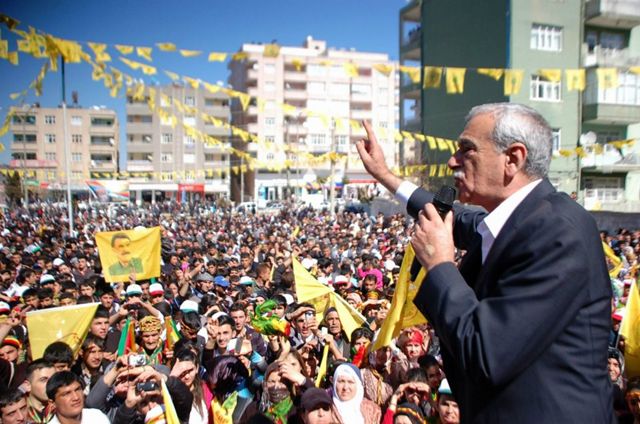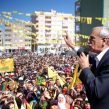
Losing the Initiative: The PKK’s Crumbling Strategy
Publication: Terrorism Monitor Volume: 10 Issue: 6
By:

The winter of 2011/2012 witnessed an intensified campaign by the Turkish government against the Partiya Karkeren Kurdistan (PKK) and the network of organizations and individuals that supports it. The armed group, identified as a terrorist organization by Turkey, the European Union, Canada and the United States, has been attacked by Turkey’s counterinsurgency campaign at different levels. Persistent cross-border air strikes continue to hit PKK bases in the Qandil Mountains of northern Iraq, as the Turkish military try to create havoc in PKK’s “safe havens.” Given the difficulty of moving in the mountains of Iraqi Kurdistan and southeastern Turkey during the winter, the PKK has traditionally staged a “tactical retreat” to their bases in winter, transferring operations to their urban branches and returning to the field as soon as possible in the spring.
However, this year the PKK commanders decided to break this cyclical pattern and engage Turkish security forces in a winter campaign. The decision proved short-sighted, as PKK casualties reached into the hundreds, with at least ten fighters dying from exposure in the rough winter conditions (Today’s Zaman, December 27, 2011; Firat News Agency, March 12). The campaign also led to a peak in surrenders, as security forces captured dozens of PKK fighters. Some of those who were interrogated have been cooperative and provided substantial information leading to the discovery of several PKK hideouts located in rural areas of southeastern Turkey containing considerable amounts of explosives, weapons and food (Today’s Zaman, December 27, 2011; Hurriyet Daily News, March 16).
In an attempt to seize the initiative, Turkey’s ruling Adalet ve Kalkinma Partisi (AKP – Justice and Development Party) has also been working on a new strategy aimed at exploiting and widening internal divisions within the PKK. The idea, suggested and planned by the Interior Ministry, is to implement a system of bounties for the capture of PKK mid- and high-level cadres. Should it be accepted, the new system is supposed to work within the existing framework of Law No. 221 of the Turkish Penal Code, which grants amnesty to members of terrorist organizations who defect without having participated in any prior criminal action. Accordingly, the strategy aims at attracting those who only recently joined the PKK and tries to exploit recent waves of defections. Even though it is unlikely to lead to substantive captures, it is expected to create tensions and increase distrust within PKK (Today’s Zaman, February 29; March 9).
The Turkish government has also tackled the PKK’s political infrastructure. Since November, 2011 Turkish authorities have launched an ongoing crackdown on the Koma Civaken Kurdistan (KCK), an illegal political organization that gathers several Kurdish organizations together under one umbrella. The KCK is accused of operating as an urban and political wing of the PKK and of running “a state within a state” in southeastern Turkey through a parallel government that carries out tax collection and administers justice (Hurriyet Daily News, November 22, 2011; Today’s Zaman, December 28, 2011). By arresting several key members, the operation increased communications difficulties between the KCK and the Qandil-based Kongra-Gel (the KCK’s executive assembly), chaired by PKK commander Murat Karayilan. Communications with Abdullah Ocalan have been interrupted as well. For years, the PKK’s imprisoned founder kept leading the terrorist group via confidential communications with his lawyers, the only visitors he was allowed to have while serving his life sentence in isolation at the Imrali Island prison. However, visits were suspended several months ago, and many of his lawyers were arrested for their alleged ties with KCK, leaving the PKK without Ocalan’s strategic guidance (Today’s Zaman, November 22).
The crackdown on the KCK triggered strong protests by the Baris ve Demokrasi Partisi (BDP – Peace and Democracy Party), Turkey’s main Kurdish political party. The party was founded in 2008, just before its predecessor, the Demokratik Toplum Partisi (DTP – Democratic Society Party), was disbanded for its ties with PKK. The BDP has been accused of being the electoral offshoot of the PKK and several of its members and mayors (the BDP runs almost 100 municipalities in Turkey) have recently been arrested for their alleged affiliation with the KCK. Despite its high electoral appeal to Turkey’s Kurdish community, BDP leaders have so far lacked political incisiveness, and seem now stuck on the pursuit of long term objectives, while they have not yet managed to engage the government in short term-oriented negotiations.
The BDP’s recent proposal for the creation of a governmental delegation to start negotiations with the PKK will hardly lead anywhere, given the fact that the party insists on a general amnesty for all PKK fighters (including Abdullah Ocalan), a clear no-go for the Turkish government (Today’s Zaman, February 6). The BDP’s political feebleness becomes apparent when considering that, behind the scenes; Turkish authorities have already started informal negotiations with the PKK itself. Representatives of the Turkish government have been meeting Abdullah Ocalan on a regular basis and top level officials from the Milli Istihbarat Teskilati (MIT – National Intelligence Organization) met high-ranking PKK members in order to discuss and assess potential proposals. In fact, discussions with Ocalan were close to bringing about some elements of agreement in the summer of 2011, but PKK hardliners expressed their opposition to the talks by staging a major attack on Turkish troops, killing 13 soldiers (Today’s Zaman, July 27, 2011; February 6, 2012).
The PKK’s troubled situation suggests some cautious optimism for Turkey’s counterterrorism efforts; in recent months the organization has been hit both at the military and political level. However, it seems the PKK hardliners ultimately have the upper hand, as ambushes against Turkish troops and terrorist attacks in urban areas continue regardless of any top-level negotiation. Paradoxically, the PKK’s strategic failure might in fact hinder future negotiations: as the movement becomes more and more fragmented without a proper national platform for political discussion. As long as the PKK hawks keeps refusing any form of dialogue, meetings between Turkey’s representatives and PKK leaders are doomed to bring only fleeting results, if any.
Francesco F. Milan is a PhD Candidate in the Department of War Studies at King’s College in London.





